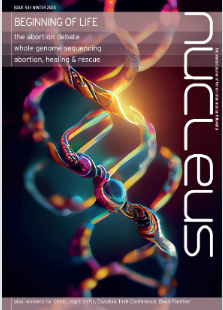What a great benefit our training is. I went to an all-boys school, an all-male college at university and then attended the Royal London Hospital for clinical training. Very soon I found myself on a gynaecology firm and was expected to take a history from ladies! How I struggled at first. I was so embarrassed and it was so difficult. However there was no avoiding it — I had to take these histories, so I got on with it. By the end of two months I was coping.
At one CMF conference I was leading a seminar on personal evangelism. At the beginning I asked the group of about thirty people whether they thought it was right for them to use their status as a doctor to share their Christian faith. Surprisingly only five of the thirty felt it was right to do so. The reasons given for not sharing their faith included: 'there is no time'; 'it is not what we are paid for'; 'it may lead to distrust', and the like. At the end of the seminar I asked the group how many of them have even led someone to Christ. It was striking that the only ones who had done so were the same five who felt it was right to share their faith!
When Jesus was training his disciples, he first sent out the twelve, his inner circle. Their responsibility was to proclaim the kingdom of God and to heal those who were ill (Luke 9:2). A little later he sent out 72 others. As the number of his followers after his resurrection amounted to 120, this must have represented a large proportion of the men. They were to go into every town they were approaching to prepare people for Jesus' arrival. He told them, 'The harvest is plentiful, but the workers are few. Ask the Lord of the harvest, therefore, to send out workers into his harvest field. Go! I am sending you like lambs among wolves. (Luke 10:2). That is just what I felt like as a young clinical student on the 'gynae' firm!
There is a problem today that some Christians think they are witnessing by the moral, kind way they practise their profession. Jesus does not agree that lifestyle is sufficient. Professor David Short was the Queen's Physician in Scotland. He was very eminent and highly regarded. One day he overheard some of his colleagues talking about him. They were saying what a great man he was in so many areas. However they did not mention that he was a Christian. It then dawned upon him that much of what he had done in medicine had been for his own glory and not that of the Lord Jesus. Jesus chose us to live for his glory and nothing less.
A man approached Jesus and Jesus said to him, Follow me. But that man had other priorities, Lord, first let me go and bury my father'. If his father had already died, he would, according to Jewish tradition, have already buried him. No, this was an excuse. Jesus replied expressing what should be the priority of his followers, Let the dead bury their own dead, but you go and proclaim the kingdom of God. (Luke 9:60)
Proclamation of the gospel has always been the priority of Jesus — we must continue to declare his rule. Another man said he would like to follow Jesus - but added the excuse of his family. Jesus replied, No-one who puts a hand to the plough and looks back is fit for service in the kingdom of God. (Luke 9:62) We Christians have been chosen, whatever career we follow, to serve the Lord Jesus and his kingdom.
It was immediately following this that Luke describes how Jesus embarked on training the 72 by sending them out on a mission. They needed to learn how to speak about spiritual matters. He said to them, When you enter a house, first say, 'Peace to this house.' (Luke 10:5) How important it is to make good first impressions. Aren't we taught this as doctors, nurses and other health professionals?
'When you enter a town and are welcomed, eat what is offered to you. Heal those there who are ill and tell them, 'the Kingdom of God has come near to you'. (Luke 10:8-9)
These remain our priorities — to love and speak. What were they to do when they were not welcomed as Jesus' representatives? Go into its streets and say, 'Even the dust of your town we wipe from our feet as a warning to you'. Yet be sure of this: the kingdom of God has come near. (Luke 10:10-11).
Jesus is clear that those who are not interested in what God has to say to them through his representatives will have to face dire consequences. Jesus said to the 72, I tell you, it will be more bearable on that day for Sodom than for that town. (Luke 10:12)
Jesus continued, Whoever listens to you listens to me; whoever rejects you rejects me; but whoever rejects me rejects him who sent me. (Luke 10:16) Speaking for Jesus really is important.
We do have a problem today. We are not training young Christians how to speak about Jesus to non Christians, as Jesus did. I had a patient who was churchwarden of her local village church. After the medical issues had been dealt with, I asked her how the church was going. She replied, 'It is getting very difficult. We are getting smaller and older.' 'Tell me', I replied, 'Do members of the church talk about the Lord Jesus with others in the village?' 'Oh good gracious me, no, we don't even speak about him amongst ourselves!' I could only think of one thing to say, 'If that is true, then your church must die.'
To speak about Jesus does require training. As medical students we were taught to take a clinical history. We had to ask about the present condition, past history, drug history, family history and social history. We should also ask about their spiritual history. 'Do you have a faith that helps you, or aren't you sure about such things?'
As all people are a composite of physical, psychological and spiritual aspects and each has an affect on the others, it could be said to be negligent not to take a spiritual history! The other advantage is that people will often reply with phrases such as, 'I wish I did', 'I used to have', or 'my parents did', which are great openings to help people spiritually.
It was because many of my patients wanted to find answers, and time was limited, that I wrote the book, Cure for Life [1] that CMF published for many years and is now available in its fifth edition. If any are unsure about whether all Christians are meant to be able and willing to talk about Jesus please do read my new book, The Duty of a Disciple [2].
The commission to God's church, which includes medics and nurses and midwives, has never changed, All authority in heaven and earth has been given to me. Therefore go and make disciples ...teaching them to obey everything I have commanded you. And surely I am with you always, to the very end of the age. (Mathew 28:18-20)
































